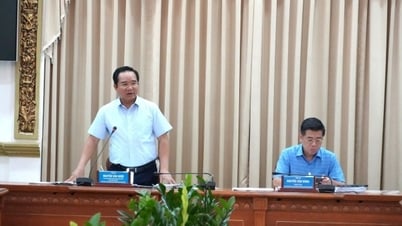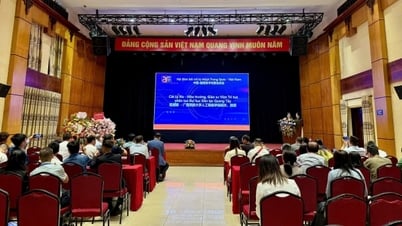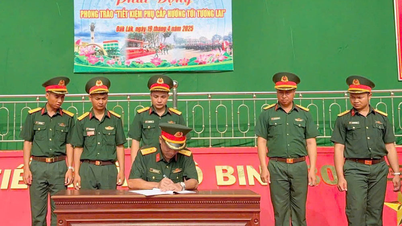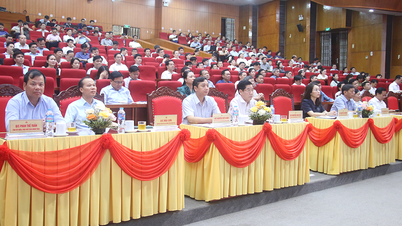Where did the leaked documents come from?
According to a complaint filed by FBI special agent Patrick Lueckenhoff in charge of intelligence and counterintelligence, in December 2022, a user account on the Discord chat system server in Teixeira's friendlist posted confidential information discussing geopolitical issues in several regions. Then, in January 2023, many photos of documents "with signs of being classified as classified US government documents" began to be posted on Discord, describing the conflict between Russia and Ukraine, including troop movements, Ukrainian military deployments, and analyzing and assessing situations that could lead to Russia using nuclear weapons.
According to Special Agent Patrick Lueckenhoff, these military documents include reports “based on sensitive U.S. intelligence, gathered through highly classified sources and methods.” Mr. Lueckenhoff emphasized that when documents are classified as “top secret,” it means that if disclosed, it could have “exceptionally serious consequences” for national security.
The FBI agent's complaint also said that Teixeira told his Discord contacts that “out of concern that he might be discovered taking pictures of documents at work, Teixeira secretly took the documents back to his residence to take pictures.”
Images of some of the leaked military documents showed that they were taken in a residential area, with details such as kitchen counters, floor tiles, and various personal items on a desk. According to The New York Times, digital tracing was used to identify the suspect. The distinctive pattern of the dark granite counters and glazed floor tiles in Teixeira's mother's home contributed to the identification and arrest of the suspect. Once the images were obtained, investigators and the press compared them to photos of the family home in the area posted online by one of Teixeira's relatives, matching the details and concluding that Jack Teixeira was highly likely to be the person who leaked the classified information online.
Who is the suspect in the military document leak?
Private First Class Jack Teixeira is an information technology specialist with the 102nd Intelligence Group, Otis Air Force Base, Cape Cod, Massachusetts, Air National Guard, responsible for military communications networks, including cable systems and foreign intelligence reception centers.
Jack Teixeira, who grew up in a military family in North Dighton, Massachusetts, about 50 miles south of Boston, and worked in information technology, had a stepfather and half-brother who worked at Otis Air Force Base. His unit provided intelligence from around the world to units in support of operations and homeland security. The private was granted a “top secret security clearance” in 2021. With that clearance, Teixeira had to sign a “lifetime non-disclosure agreement” not to disclose the information he had been exposed to and agreed that leaking classified information could result in criminal prosecution.
According to the US website NPR, many of the user accounts on the Discord chat system where Teixeira leaked classified information were interested in using guns and some of them had racist views. The founder of Discord also used the profile picture of Terry Davis, a computer programmer who often said he heard the voice of God and was told what to do. Teixeira's friends said he did not intend to widely distribute the military documents on the system, but only shared them within the scope of his chat room, but at least one friend of the private posted these documents to other Discord servers. Also according to information from the indictment on April 14 (US time), Teixeira posted the documents using an account registered with his real name and credit card information. The Times reported that Teixeira was the leader of a closed online gaming group called "Thug Shaker Central" (roughly translated: Thug Shaker Central), where military documents were leaked in recent months. The documents reveal many military secrets, including predictions by US officials about the military efforts of Ukraine and Russia...
This is not the first time an IT employee has leaked classified information. Previously, in 2013, Edward Snowden published a series of documents from the US National Security Agency. Edward Snowden was a contractor and IT systems administrator in Hawaii and, like many other IT administrators, Snowden had access to a series of important information records and logged into servers to troubleshoot technical problems.
Jack Teixeira charged with multiple crimes
On April 14 (US time), suspect Jack Teixeira was brought to testify before a federal judge in Boston. According to CNN, the trial of National Guard Private Jack Teixeira will be held next Wednesday (April 19). According to CBS, during the first hearing on April 14 (US time), Teixeira did not say anything. When asked if he understood the right to remain silent, Teixeira replied with only one word, “Yes,” before being handcuffed and led out of the room.
Federal prosecutors have accused Teixeira of masterminding the leak of military documents over several months and have charged him with “unlawful retention and dissemination of national defense documents” and “unlawful deletion and retention of classified documents.” Attorney General Merrick Garland said Teixeira could face charges under the Espionage Act. Each charge carries a maximum sentence of 10 years in prison, meaning Teixeira could face a lengthy prison sentence. U.S. officials have not yet provided details about the investigation or the scope of the leak.
According to The Hill, the US Department of Defense press secretary, Major General Patrick Ryder, called Teixeira's leak of this information a "deliberate crime." The incident has forced the Pentagon to review and re-evaluate the method of distributing information and military reports. According to estimates, about 1 million Americans have access to intelligence information, but currently the list of subjects accessing intelligence reports has been significantly narrowed.
Reaction of target countries and US allies
Senior military leaders and US diplomats have been reaching out to allies to address the fallout, including calls to “reassure allies of our commitment to protecting intelligence and the integrity of our relationships with our security partners.” But governments around the world are well aware of Washington’s penchant for “spying” even on its friends, and if they ever forget, leaks like this will remind them.
Responding to the latest leak of top secret information, South Korea, a key US ally, said it would discuss “issues raised” in leaked memos showing US intelligence spying on Seoul officials at a summit with the US scheduled for later this month.
Israeli Prime Minister Benjamin Netanyahu, whose government is increasingly at odds with President Joe Biden's administration, issued a formal statement asserting that the content described in the US intelligence report on the Mossad intelligence agency is "fabricated and without any basis".
Kremlin spokesman Dmitry Peskov called the revelations about US spying on Russia “nothing surprising.” Asked about Russia’s alleged involvement in the leaks, he said the US “tends to blame everything on Russia” and declined to comment.
European and NATO countries have responded little or nothing publicly, perhaps due in part to the Easter holidays. In a statement on Monday (April 10), the Bulgarian Ministry of Defense denied that the country had held talks about providing MiG-29 jets to Ukraine, as reported in leaked military documents. The national cryptography unit of the Canadian Communications Security Establishment said it would not comment on policy, even as a leaked document described a breach of Canada’s information systems by a group of hackers.
The leak of hundreds of military documents, including at least 50 classified documents, is the largest breach of US national security since Edward Snowden in 2013. The public has raised many questions, including questions about the security of intelligence systems, how to strengthen security, why a 21-year-old private had such deep access to intelligence systems, the scope and consequences of the leak, and whether there was a “redundancy” in Teixeira’s arrest yesterday, April 14 (US time).
HUU DUONG
Source


![[Photo] More than 17,000 candidates participate in the 2025 SPT Competency Assessment Test of Hanoi National University of Education](https://vphoto.vietnam.vn/thumb/1200x675/vietnam/resource/IMAGE/2025/5/17/e538d9a1636c407cbb211b314e6303fd)
![[Photo] General Secretary To Lam visits exhibition of achievements in private economic development](https://vphoto.vietnam.vn/thumb/1200x675/vietnam/resource/IMAGE/2025/5/18/1809dc545f214a86911fe2d2d0fde2e8)
![[Photo] National conference to disseminate and implement Resolution No. 66-NQ/TW and Resolution No. 68-NQ/TW of the Politburo](https://vphoto.vietnam.vn/thumb/1200x675/vietnam/resource/IMAGE/2025/5/18/adf666b9303a4213998b395b05234b6a)




















![[Photo] Prime Minister Pham Minh Chinh chairs meeting on science and technology development](https://vphoto.vietnam.vn/thumb/1200x675/vietnam/resource/IMAGE/2025/5/17/ae80dd74c384439789b12013c738a045)



































































Comment (0)